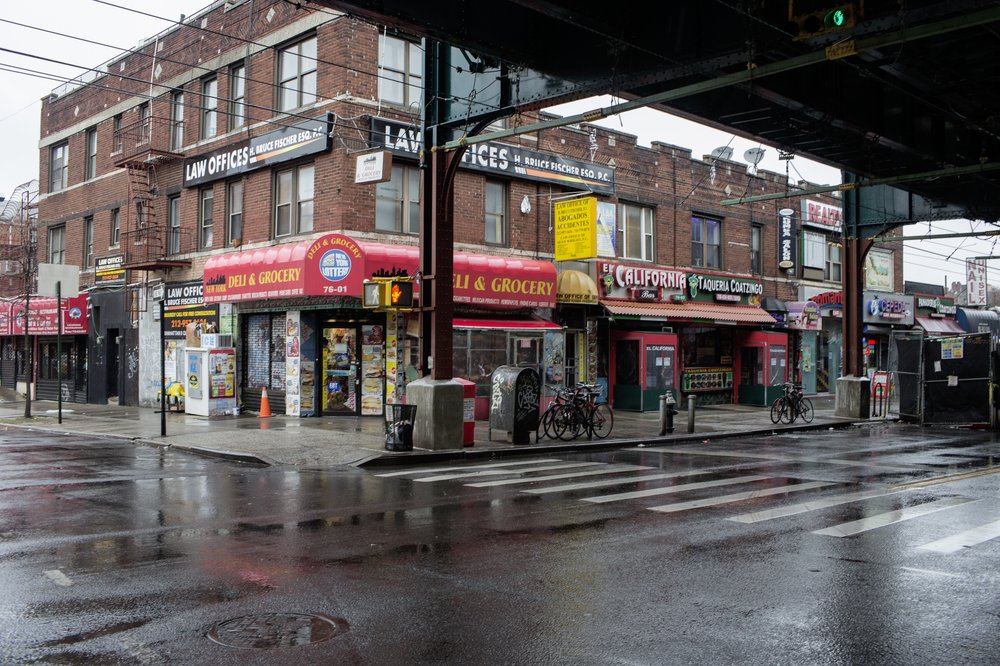Some Queens residents call for policing as sex work gets more visible on Roosevelt Avenue
March 27, 2024, 6 a.m.
Thirteen massage parlors on Roosevelt Avenue were shut down in January.

Residents in Corona, Queens are growing frustrated that sex workers solicit passersby on Roosevelt Avenue despite a recent police crackdown.
Police and activists said the rise of open-air sex work coincides with the influx of new migrants who are desperate for employment. But in the last five years, the NYPD has shifted from arresting sex workers to targeting the establishments that employ them. In January, police shut down 13 massage parlors on Roosevelt Avenue they said were operating as brothels, but police officials said new ones have taken their place.
Calls for a police crackdown on sex work are butting up against the city’s move away from prostitution arrests. And while police officials said arresting sex workers is not the answer, they also conceded that the sting operations they've been leaning on have not led to a long-term fix.
“Once we shut one down, it’s so easy to open another location literally next door,” NYPD Capt. Stanislav Levitsky said. “It’s not a big loss for whoever’s running the operation. Just a temporary setback.”
There were about 20,000 prostitution arrests in 1985, and about 2,000 a decade ago. Meanwhile, just 107 took place last year, according to data shared with Gothamist by the Data Collaborative for Justice at John Jay College.
At the same time, several local district attorneys have stopped pursuing prostitution charges and dismissed existing cases. State lawmakers last year passed a measure limiting law enforcement’s ability to treat sex work as a crime.
Police said closing unlicensed massage parlors is one way to curb sex work without arresting individual sex workers, but added that those efforts can be ineffective.
When residents make repeated 311 or 911 calls about a specific address, the NYPD’s vice squad runs undercover sting operations to establish which businesses accept money for sex, according to Levitsky. Police then submit evidence to the NYPD’s Civil Enforcement Unit, which goes through a legal process to get a closing order from a judge.
Police then serve these closing orders, as they did alongside Mayor Eric Adams earlier this year. But the legal process takes several months, Levitsky said.
Prosecutors vary on how they pursue prostitution-related cases. While the Manhattan, Bronx and Brooklyn district attorneys have stopped pursuing most prostitution charges, their Queens and Staten Island counterparts prosecuted every prostitution charge in 2022, according to the John Jay data.
A spokesperson for Queens DA Melinda Katz said her office focuses on prosecuting sex trafficking, not sex work, and that people arrested for prostitution are connected with services.
Local leaders said controlling sex work and trafficking remains a priority.
“While the city government authority is limited in regulating sex work, we remain steadfast,” City Councilmember Francisco Moya said in a statement to Gothamist, adding that such massage parlors are run under “deplorable conditions.”
Advocates said arresting sex workers is not the solution.
Nearly everyone arrested on prostitution charges in Queens in the last two years arrived in the United States in that time, according to Leigh Latimer, a supervising attorney with the Legal Aid Society’s Exploitation Intervention Project. Latimer added that people pass along the work opportunities through word of mouth.
“If we spent less money on the NYPD and more on helping people be able to eat and have a safe place to live, there probably would be less sex work happening,” she said.
Yves Tong Nguyen, an advocate who offers migrant sex workers cash assistance through Red Canary Song, a grassroots group of Asian and migrant sex workers and massage workers, agreed.
“There’s a reason why people get engaged in this informal labor; because it’s what’s available to them,” Nguyen said, adding that sex work is often the only viable option for people without legal status in this country who don’t speak English and send money to family in their home countries.
While some Queens residents said they empathized with migrant sex workers, others like Lourdes Osorio have a zero-tolerance policy.
Osorio, who’s lived in Corona for more than 50 years with her family, said she’s found new routes to avoid passing sex workers on the street while walking with her grandkids.
“They see you walking with your man and they pull at him,” she said. “There’s no respect at all … it happens in broad daylight.”
Corona community leader Mauricio Zamora added that sex work has become more visible on the sidewalks in the last two years. The police haven’t cracked down on massage parlors since the January raid, he said.
“It’s gone back to what it normally is,” Zamora said.
Josefa Velásquez contributed to reporting.
There used to be tens of thousands of prostitution arrests annually in NYC. Now? About 100. Corona Plaza vendor market in Queens set to reopen Wednesday — with far fewer vendors